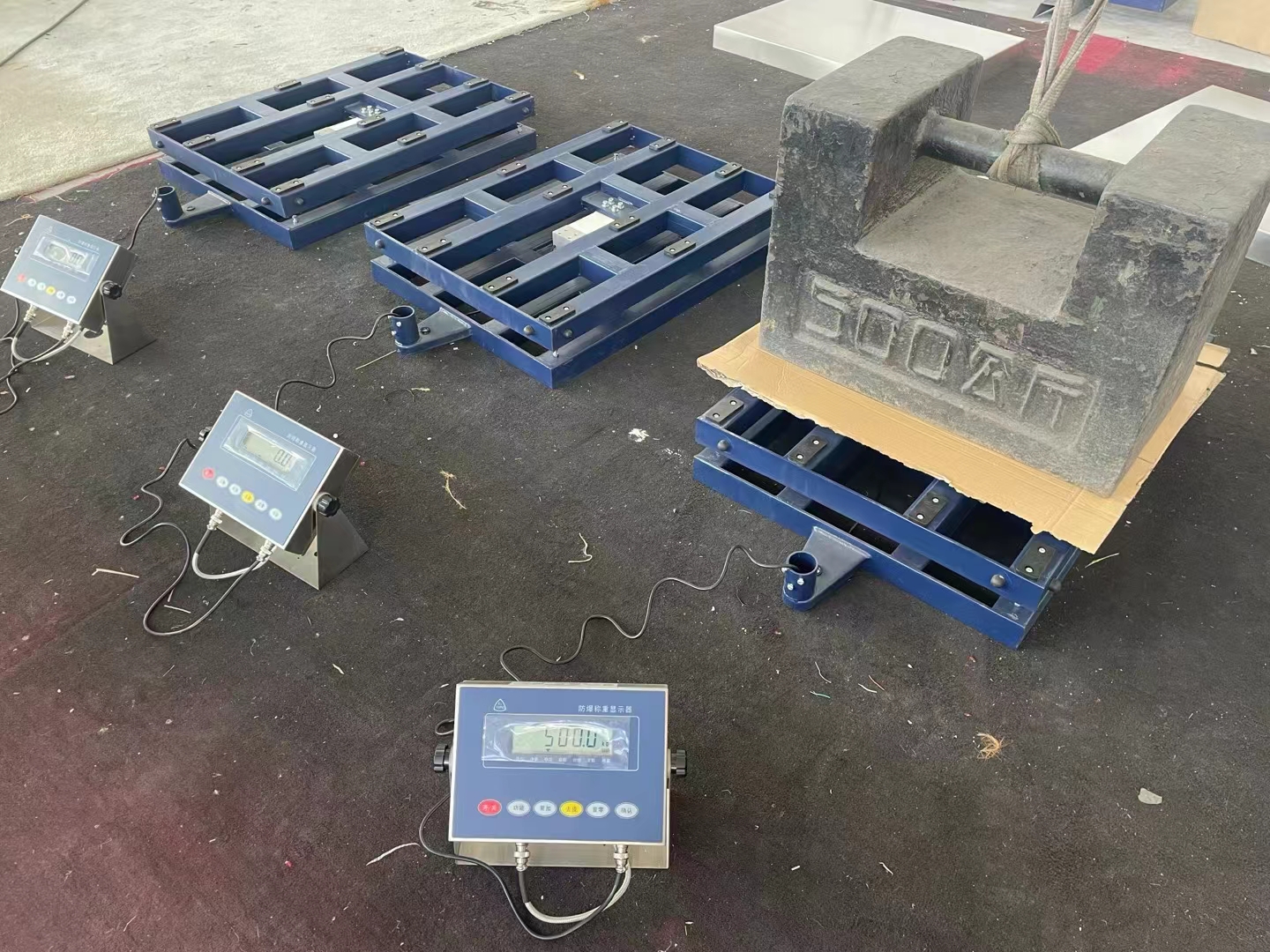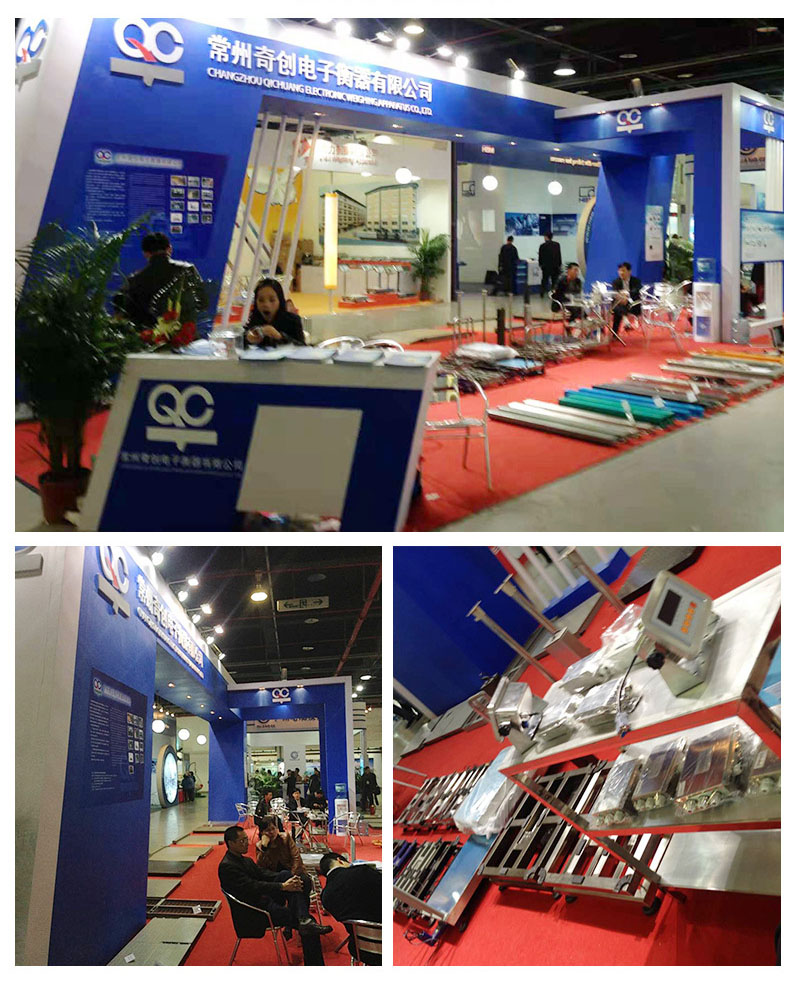Carbon Steel Bench Scale
QC Weighing
Carbon Steel
250X250mm~600X800mm
15kg~600kg
| Availability: | |
|---|---|








 QC weighing bench scale catalog.pdf
QC weighing bench scale catalog.pdf
When it comes to precision weighing in industrial settings, the choice of materials for bench scales is crucial. Enter the carbon steel bench scale—a robust and reliable option that has garnered attention across various industries. But what exactly makes these scales stand out? Let's dive into the world of carbon steel bench scales and uncover their significance.
| Capability | 15kg | 30kg | 60kg | 100kg | 150kg | 200kg | 300kg | 500kg | 600kg |
|---|---|---|---|---|---|---|---|---|---|
| Division | 2g | 2g | 5g | 10g | 10g | 20g | 20g | 50g | 100g |
| Size | 250*250mm 300*400mm 400*500mm 500*600mm 600*800mm 800*800mm | ||||||||
| Material | Carbon steel scale frame + stainless steel pan (optional full stainless steel material) | ||||||||
| Humidity | <85%RH | ||||||||
| Temperature | -10℃ ~ 40℃ | ||||||||
| Accuracy | Ⅲ | ||||||||
| Specification |
| ||||||||


(1) Maintain good weighing habits when using. The weighing goods should be placed in the middle of the electronic scale as much as possible to allow the scale sensor to receive balanced force. Avoid uneven force on the scale platform causing slight inclination, resulting in inaccurate weighing and affecting the service life of the electronic platform scale.
(2) When weighing, avoid overloading to ensure that the electronic platform is not damaged and the measurement is accurate.
(3) Keep the sensor clean and free of interference to avoid inaccurate weighing and skipping.
(4) Keep all connections secure to ensure normal use.
(5) When weighing, avoid contact, collision or vibration with the scale body.
(1) When using electronic equipment, avoid being close to sources of heat and vibration.
(2) Since there may be threats from insects and rats in many usage situations, some parts of the signal lines of the electronic scale are exposed, so it is necessary to strictly prevent damage by insects and rats.
(3) Keep the scale body clean and tidy to ensure the accuracy of measurement and the type of the platform. service life
(1) When the weighing display controller cannot be used for a long time (such as more than a month), power-on inspection should be carried out according to environmental conditions to avoid corrosion from moisture or other bad gases that will affect reliability.
(2) Open the scale cover regularly and remove the debris below. To ensure the stability of the electronic scale.
(3) If the weighing display of the electronic platform scale fails, the power should be cut off quickly. If the cause of the power outage cannot be accurately determined, the professional engineers of our company should be notified for inspection and sorting. Users cannot dismantle the chassis at will, let alone replace internal parts at will.
Bench scales are versatile weighing instruments used extensively in industries like manufacturing, food processing, pharmaceuticals, and laboratories. Their precision and durability are essential for ensuring accurate measurements, which are critical for quality control, compliance, and efficiency.

Designed to withstand harsh industrial environments.
Suitable for weighing heavy items without damage.
Ensures precision and consistency.

In laboratories, stainless steel bench scales are used for weighing chemicals, samples, and other materials with high precision, ensuring accurate and reliable results.
Industries utilize these scales for weighing parts, materials, and products. Their durability and accuracy help maintain quality control and efficient production processes.
The food and beverage sector relies on stainless steel bench scales for portion control, ingredient measurement, and quality assurance, ensuring consistent product standards.
In pharmaceuticals, precise measurement is critical. Stainless steel bench scales are used to weigh ingredients for drug formulation, ensuring compliance with stringent regulations.
Stainless steel provides a robust structure that can withstand heavy use and harsh conditions, making these scales long-lasting.
The non-porous surface of stainless steel is easy to sanitize, making it ideal for environments where hygiene is crucial, such as food processing and pharmaceuticals.
These scales can be used in a wide range of environments and applications due to their robust and adaptable design.
While the initial cost may be higher, the longevity and low maintenance needs of stainless steel bench scales make them cost-effective over time.

When selecting a carbon steel bench scale, several factors should be taken into account to ensure it meets your specific needs.
Determine the maximum weight the scale will need to measure. Choose a scale with a load capacity that exceeds this requirement to ensure longevity and reliability.
Consider the level of precision required for your applications. High-precision scales are essential for tasks that demand exact measurements.
Look for scales that are easy to maintain and built to last. Regular maintenance can extend the lifespan of your bench scale and ensure continued accuracy.
Provide ongoing training and support for operators responsible for using the truck scale. Ensure they understand proper operating procedures, safety protocols, and troubleshooting techniques to address common issues. Regular training sessions can improve efficiency and reduce the risk of operator errors.
Address any issues free and promptly in one year by repairing or replacing damaged or malfunctioning components. This may include replacing load cells, cables, junction boxes, or electronic parts that are no longer functioning properly(except for natural disasters and man-made damage).
Stay updated with the latest software releases and system upgrades for the truck scale. Install software updates provided by the manufacturer to enhance performance, add new features, or address security vulnerabilities. Consider upgrading the scale's system hardware if needed to meet changing operational requirements.
Maintain service agreements with qualified technicians or service providers 24h remote hotline technical assistance to urgent service requests and provide onsite assistance when needed.


A: The lifespan of a carbon steel bench scale can vary based on usage and maintenance. With proper care, they can last several years.
A: Calibration frequency depends on the scale’s usage and the industry standards. Generally, it's recommended to calibrate bench scales every six months to a year.
A: While carbon steel is durable, it is prone to rust if not properly protected. For outdoor use, ensure the scale has a protective coating or consider stainless steel alternatives.
A: Common issues include inaccurate readings, mechanical failures, and rusting. Regular maintenance and proper care can prevent these problems.
A: Carbon steel bench scales are generally more affordable and durable, but they can rust more easily than stainless steel scales. Stainless steel scales offer better corrosion resistance but are typically more expensive.
 QC weighing bench scale catalog.pdf
QC weighing bench scale catalog.pdf
When it comes to precision weighing in industrial settings, the choice of materials for bench scales is crucial. Enter the carbon steel bench scale—a robust and reliable option that has garnered attention across various industries. But what exactly makes these scales stand out? Let's dive into the world of carbon steel bench scales and uncover their significance.
| Capability | 15kg | 30kg | 60kg | 100kg | 150kg | 200kg | 300kg | 500kg | 600kg |
|---|---|---|---|---|---|---|---|---|---|
| Division | 2g | 2g | 5g | 10g | 10g | 20g | 20g | 50g | 100g |
| Size | 250*250mm 300*400mm 400*500mm 500*600mm 600*800mm 800*800mm | ||||||||
| Material | Carbon steel scale frame + stainless steel pan (optional full stainless steel material) | ||||||||
| Humidity | <85%RH | ||||||||
| Temperature | -10℃ ~ 40℃ | ||||||||
| Accuracy | Ⅲ | ||||||||
| Specification |
| ||||||||


(1) Maintain good weighing habits when using. The weighing goods should be placed in the middle of the electronic scale as much as possible to allow the scale sensor to receive balanced force. Avoid uneven force on the scale platform causing slight inclination, resulting in inaccurate weighing and affecting the service life of the electronic platform scale.
(2) When weighing, avoid overloading to ensure that the electronic platform is not damaged and the measurement is accurate.
(3) Keep the sensor clean and free of interference to avoid inaccurate weighing and skipping.
(4) Keep all connections secure to ensure normal use.
(5) When weighing, avoid contact, collision or vibration with the scale body.
(1) When using electronic equipment, avoid being close to sources of heat and vibration.
(2) Since there may be threats from insects and rats in many usage situations, some parts of the signal lines of the electronic scale are exposed, so it is necessary to strictly prevent damage by insects and rats.
(3) Keep the scale body clean and tidy to ensure the accuracy of measurement and the type of the platform. service life
(1) When the weighing display controller cannot be used for a long time (such as more than a month), power-on inspection should be carried out according to environmental conditions to avoid corrosion from moisture or other bad gases that will affect reliability.
(2) Open the scale cover regularly and remove the debris below. To ensure the stability of the electronic scale.
(3) If the weighing display of the electronic platform scale fails, the power should be cut off quickly. If the cause of the power outage cannot be accurately determined, the professional engineers of our company should be notified for inspection and sorting. Users cannot dismantle the chassis at will, let alone replace internal parts at will.
Bench scales are versatile weighing instruments used extensively in industries like manufacturing, food processing, pharmaceuticals, and laboratories. Their precision and durability are essential for ensuring accurate measurements, which are critical for quality control, compliance, and efficiency.

Designed to withstand harsh industrial environments.
Suitable for weighing heavy items without damage.
Ensures precision and consistency.

In laboratories, stainless steel bench scales are used for weighing chemicals, samples, and other materials with high precision, ensuring accurate and reliable results.
Industries utilize these scales for weighing parts, materials, and products. Their durability and accuracy help maintain quality control and efficient production processes.
The food and beverage sector relies on stainless steel bench scales for portion control, ingredient measurement, and quality assurance, ensuring consistent product standards.
In pharmaceuticals, precise measurement is critical. Stainless steel bench scales are used to weigh ingredients for drug formulation, ensuring compliance with stringent regulations.
Stainless steel provides a robust structure that can withstand heavy use and harsh conditions, making these scales long-lasting.
The non-porous surface of stainless steel is easy to sanitize, making it ideal for environments where hygiene is crucial, such as food processing and pharmaceuticals.
These scales can be used in a wide range of environments and applications due to their robust and adaptable design.
While the initial cost may be higher, the longevity and low maintenance needs of stainless steel bench scales make them cost-effective over time.

When selecting a carbon steel bench scale, several factors should be taken into account to ensure it meets your specific needs.
Determine the maximum weight the scale will need to measure. Choose a scale with a load capacity that exceeds this requirement to ensure longevity and reliability.
Consider the level of precision required for your applications. High-precision scales are essential for tasks that demand exact measurements.
Look for scales that are easy to maintain and built to last. Regular maintenance can extend the lifespan of your bench scale and ensure continued accuracy.
Provide ongoing training and support for operators responsible for using the truck scale. Ensure they understand proper operating procedures, safety protocols, and troubleshooting techniques to address common issues. Regular training sessions can improve efficiency and reduce the risk of operator errors.
Address any issues free and promptly in one year by repairing or replacing damaged or malfunctioning components. This may include replacing load cells, cables, junction boxes, or electronic parts that are no longer functioning properly(except for natural disasters and man-made damage).
Stay updated with the latest software releases and system upgrades for the truck scale. Install software updates provided by the manufacturer to enhance performance, add new features, or address security vulnerabilities. Consider upgrading the scale's system hardware if needed to meet changing operational requirements.
Maintain service agreements with qualified technicians or service providers 24h remote hotline technical assistance to urgent service requests and provide onsite assistance when needed.


A: The lifespan of a carbon steel bench scale can vary based on usage and maintenance. With proper care, they can last several years.
A: Calibration frequency depends on the scale’s usage and the industry standards. Generally, it's recommended to calibrate bench scales every six months to a year.
A: While carbon steel is durable, it is prone to rust if not properly protected. For outdoor use, ensure the scale has a protective coating or consider stainless steel alternatives.
A: Common issues include inaccurate readings, mechanical failures, and rusting. Regular maintenance and proper care can prevent these problems.
A: Carbon steel bench scales are generally more affordable and durable, but they can rust more easily than stainless steel scales. Stainless steel scales offer better corrosion resistance but are typically more expensive.